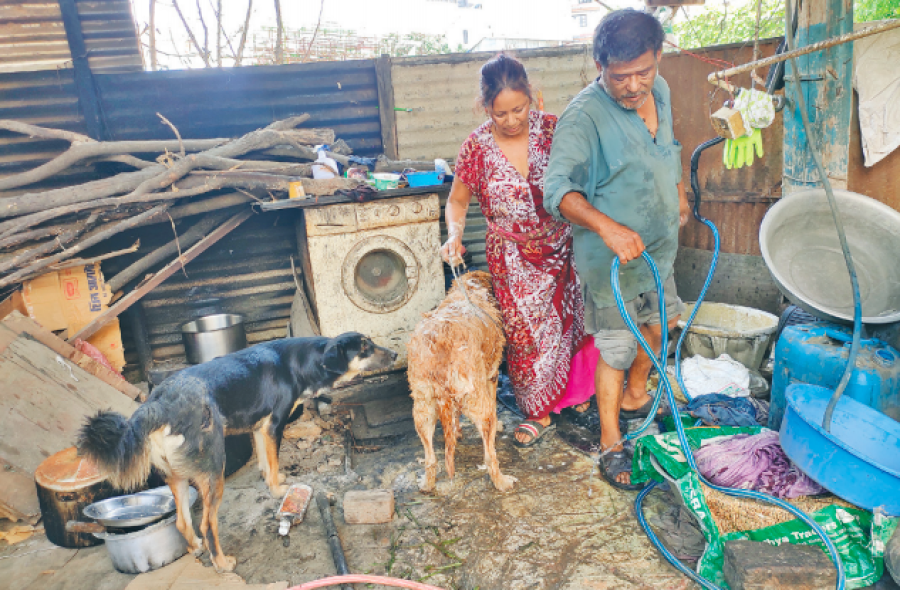Valley
Starving stray dogs face their own lockdown blues
With the Valley under prohibitory orders, they are not getting enough to eat. This has made them aggressive, say vets and dog lovers who feed them.
Anup Ojha
Last Thursday morning Mira Lamichhane, a dog lover, was returning home after buying vegetables. On the way back to her flat at Bakhundole she was surrounded by over half a dozen stray dogs. She gave them some biscuits she had carried in her bag as she always did.
But their aggressive behaviour caught her by surprise.
“I had never seen them so aggressive before,” said Lamichhane, a 31-year-old nurse. “They gobbled up the biscuits, fought among themselves and one nearly bit my hand when the biscuits were finished. They looked very hungry and wanted more food.”
Thursday was the last day that grocery shops and department stores were closed for a week as per the strict prohibitory orders enforced in the Valley to check the coronavirus transmission.
“For three days after such orders came [on May 28] they were silent, but now they have started to bark and snarl and when you go near them they become really aggressive,” said Khagendra Roka, 33, who operates an eatery at Bakhundole.
The stray dogs were hungry.
“These areas are full of restaurants, and these dogs used to survive on the leftovers from the restaurants and even customers of Big Mart used to feed them,” said Roka. “There are half a dozen dogs and a single person can’t afford to feed them all, they are really in need of food.”
He said he has been feeding one stray dog that stays in front of his closed restaurant.
Due to the prolonged lockdown, restaurants have been closed and grocery stores and butcheries are allowed to open only briefly as a result of which the stray canines have been starved.
Though some non-governmental organisations and dog lovers have been providing them food at some places like Bauddha, Jorpati, Basantapur and Patan Durbar Square, most street dogs living in their own territories in the eerie alleys, open spaces and near garbage dumps are not getting much to eat.
According to Kathmandu Metropolitan City’s estimates, there are 26,000 stray dogs in its area. Lalitpur Metropolitan City authorities do not have any such estimates.
Veterinarian Dr Rakesh Chand is not surprised to hear of the dogs being aggressive.
“Basically stray canines attack people when they face starvation because they have very limited sources for food. Besides with the rise in temperature they become more thirsty and this leads to them being even more aggressive,” said Chand. “During normal times they do not attack humans, but when they do not get food they become agitated and attack humans. Last year during the lockdown there were cases of stray dogs attacking chickens, ducks and other domesticated animals.”
According to him, stray dogs are more aggressive at night.
Sukraraj Tropical and Infectious Disease Hospital at Teku said that it had in recent times received inquiries about dog bites.
“But we do not have many people coming here for the rabies vaccine,” Dr Sher Bahadur Pun, chief at the hospital’s Clinical Research Unit told the Post. “That could be because people know that our hospital is mainly for the treatment of Covid-19 infected patients, and they fear transmission of the virus. ”
Veterinarian Dr Chand, meanwhile, said another reason for people not visiting the hospital is that they are not taking dog bites as seriously as the coronavirus infection.
“People have been mostly indoors and many feel that vaccines are not necessary,” said Chand.
For dog lovers the plight of stray dogs is heart-rending.
“They are like humans. They need to be fed. Many are on the streets with empty stomachs and they are getting more aggressive,” said Indu Maharjan of Jwagal, Lalitpur.
Her family, which includes her husband and a daughter, has been adopting and feeding stray canines for over a decade now.
At present they have adopted 30 stray dogs but every day the Maharjans feed 90 stray dogs twice a day along the Bagmati corridor between UN Park and Teku.
They give them rice, meat and biscuits with their own funds.
The 51-year-old too is aware some of them have been aggressive of late.
“There are a few dogs that have started to bite people,” she told the Post. “Even when I go to feed them regularly some of them get aggressive and fight with each other. They try to attack if people are around.”
Authorities, however, are not bothered about the stray dogs.
Dr Chandra Dhakal, information officer at the Department of Livestock, under the Ministry of Agriculture and Livestock Development, said the central government does not have any concrete mechanism regarding stray animals.
“As the country has already adopted a federal setup, it’s the responsibility of the local governments to look after the stray dogs or animals,” said Dhakal. “But there is no act or mechanism for the welfare of stray animals. We are aware of the need for an Animal Welfare Act for the protection of such animals. If there were such an Act, it would be easier to work but at the moment no such mechanism exists.”
Local governments too are unconcerned about stray dogs at the moment.
“During last year’s lockdown the City had coordinated with some dog care centers to feed stray dogs, but we do not have any plan this time,” said Raju Maharjan, spokesman of the Lalitpur Metropolitan City. “We will hold consultations and soon work on the issue and start feeding them.”




 11.84°C Kathmandu
11.84°C Kathmandu.jpg)














